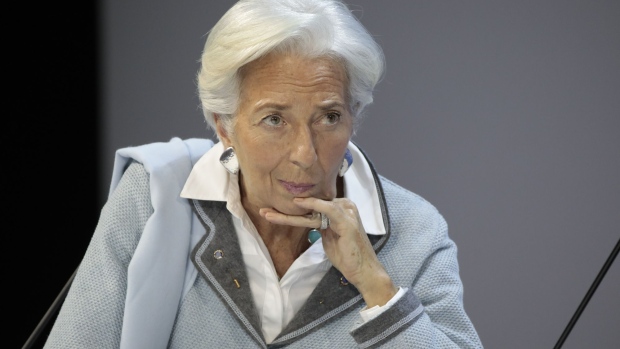Jul 17, 2019
IMF Warns Rising Trade-War Risk is Weighing on Global Economy
, Bloomberg News

(Bloomberg) -- The International Monetary Fund said more work is needed to further reduce global trade imbalances amid increasing tensions, while issuing a fresh warning that such conflicts are weighing on the global economy.
“It is imperative that all countries avoid policies that distort trade,” the IMF said in its annual External Sector Report released Wednesday in Washington. “Against a backdrop of escalating trade tensions, greater urgency is needed in tackling persistent excess imbalances.”
The report comes as the Washington-based fund confronts a surge in protectionism around the world that’s seen dragging on global growth, with output slowing in major economies from China to Europe and Mexico. IMF leadership also is in flux with Managing Director Christine Lagarde set to succeed Mario Draghi as president of the European Central Bank.
While the U.S. trade war with China has cooled with a recent truce and renewed talks, the world’s second-largest economy has slowed amid President Donald Trump’s tariffs. China’s government said this week that the economy eased to the weakest pace since quarterly data began in 1992, highlighting effects of the ongoing trade dispute with the U.S.
“Countries should refrain from using tariffs to target bilateral trade balances, as they are costly for global trade, investment, and growth, and are generally not effective in reducing external imbalances,” the report said.
World Imbalances
Overall current account balances declined marginally from the prior year to 3% of global gross domestic product in 2018, according to the report. Net creditor positions have further increased to about 20% of global output, which the fund called a historical peak that’s four times higher than early-1990s levels.
Higher-than-warranted balances are centered in the euro area, driven by Germany and the Netherlands, as well as other advanced economies such as South Korea and Singapore, according to the IMF. It said balances that are lower-than-warranted are still concentrated in the U.S. and U.K., along with some emerging economies such as Argentina and Indonesia.
China’s balance is in line with fundamentals as its current account surplus has narrowed further, the IMF said, while adding that a lasting external rebalancing requires further reforms and reining in expansionary economic policies.
“Trade risks are the number one risk to the global economy,” IMF’s Chief Economist Gita Gopinath told Bloomberg Television in June. De-escalating those tensions “would do a great deal of good for the global economy.”
Stimulus Ready
David Lipton, the IMF’s acting managing director, on Tuesday urged central banks and other policy makers to be ready with more stimulus if a global economy that’s already slowed by a trade war deteriorates. “All need to be ready in case there is a significant slowdown to respond much more forcefully,” Lipton said in a Bloomberg TV interview.
The fund’s report Wednesday called for “reviving liberalization efforts and modernizing the multilateral rules-based trading system” to better capture e-commerce and trade in services, plus more enforceable World Trade Organization commitments “through a well-functioning WTO dispute settlement system.”
The IMF in April cut its outlook for global growth to the lowest since the financial crisis amid a bleaker outlook in most major advanced economies and signs that higher tariffs are weighing on trade. The IMF forecast the world economy will grow 3.3% this year, less than the 3.5% it had estimated in January. It was third downgrade to the outlook in six months.
Reports from major economies show trade tensions weighing on global manufacturing. U.K. factory output is shrinking for the first time in almost three years while gauges for China and South Korea remain below the key 50 level. The JPMorgan Global Manufacturing PMI fell to 49.4 in June, the weakest reading in data since mid-2016.
To contact the reporter on this story: Jeff Kearns in Washington at jkearns3@bloomberg.net
To contact the editors responsible for this story: Margaret Collins at mcollins45@bloomberg.net, Sarah McGregor, Robert Jameson
©2019 Bloomberg L.P.





